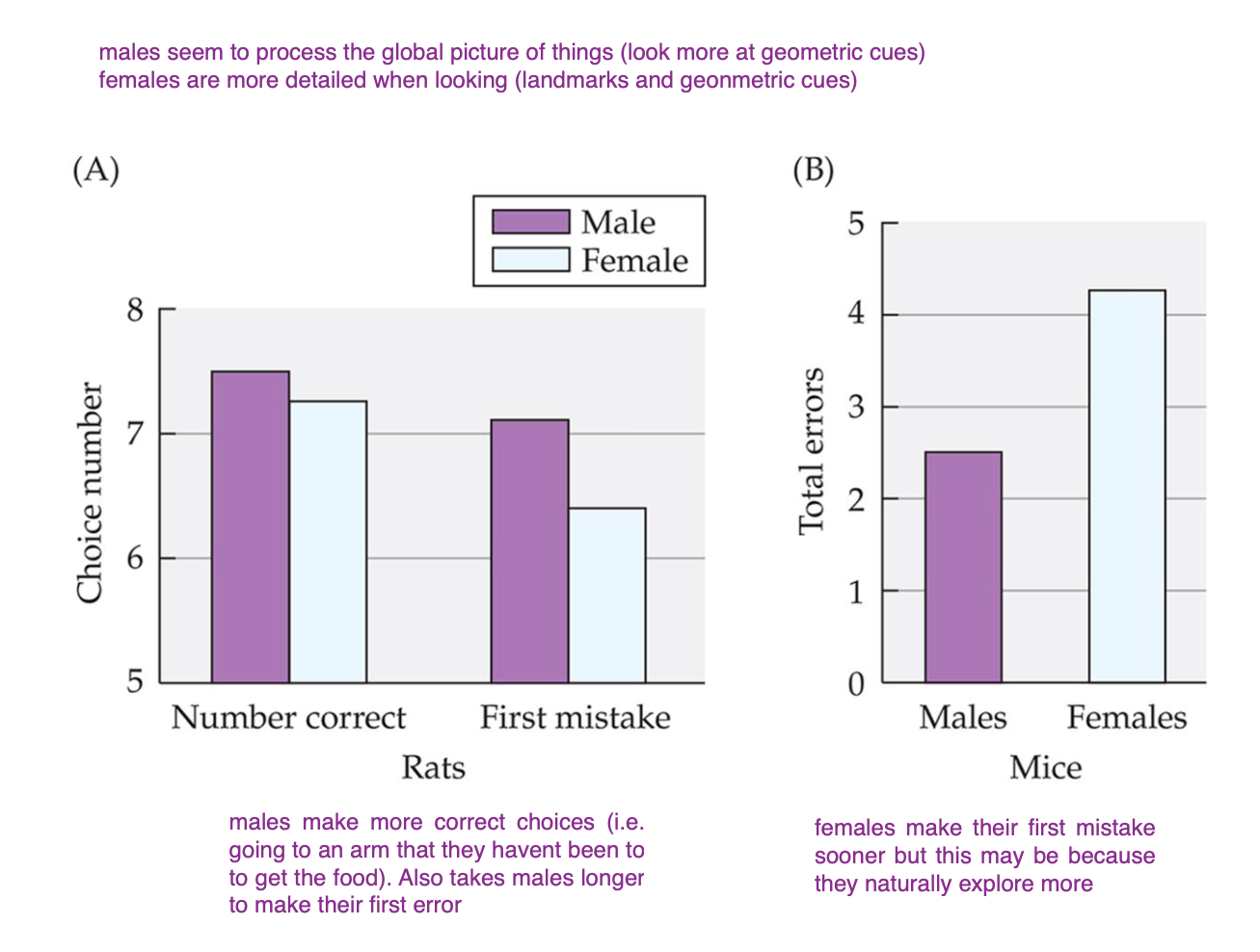12.3 : sex differences in learning and memory
1/15
There's no tags or description
Looks like no tags are added yet.
Name | Mastery | Learn | Test | Matching | Spaced | Call with Kai |
|---|
No analytics yet
Send a link to your students to track their progress
16 Terms
what were the general findings on learning and memory performance between the sexes
Female rats learn active avoidance tasks faster than males,
but males perform better in passive avoidance tasks.
These differences may reflect general activity levels rather than learning and memory differences.
what are the activity differences between the sexes
• Males are generally less active in open-field situations, which may make passive avoidance tasks easier for them.
• Females are more active, making active avoidance tasks easier for them
what was discovered in terms of freezing behavior when comparing the sexes
Males are more likely to freeze when frightened by context, contributing to differences in performance in avoidance tasks.
how was the female rat’s maze performance
The higher error rate in females may reflect increased exploratory behaviours rather than memory issues.

sex differences in anxiety regarding learning and memory performance
Males generally show more anxiety than females, affecting their behavior in open arenas.
These differences can be influenced by anxiolytic drugs or early endocrine manipulation.
how did sex difference impact spatial learning and hormones
• Males typically perform better in spatial learning tasks.
• Hormones mediate these differences, though they don’t necessarily affect learning and memory directly.
• Recent research suggests females may not have worse memory but may use different neural circuits or respond to shock differently.
what is the impact of sex hormones on stress
• Effects of sex hormones on learning performance may be indirect, influenced by intrinsic and extrinsic factors, including stress.
how did stress perception and responses vary based on sex differences
Males and females differ in their perception of stressors and in their biochemical, behavioural, and morphological responses.
Female rats show higher corticosterone levels than males in response to stress.
acute vs chronic stress sex diffs
• Males: Acute stress improves performance on spatial and visual memory tasks, but chronic stress impairs performance.
• Females: Relatively resistant to impairing effects of long-term stress; stress can improve performance in females on tasks where it harms males.
perinatal hormonal influence on sex differences
Early hormonal environments (androgens in males) organize the brain, enhancing learning in adult males after acute stress.
Lack of androgens in females makes acute stressors impair learning in adulthood.
what is the corticosterone response and relation to sex diffs
• Baseline stress glucocorticoid levels set by perinatal hormones predict stress reactivity in adulthood.
• Both males and females may show equivalent corticosterone
responses to stressors.
what do human sex differences in stress depend on
Sex differences in glucocorticoid reactivity in humans depend on hormone status, age, and cortisol assay methods.
chronic stress and findings on it reducing apical dendritic branching
• Chronic stress reduces apical dendritic branching and dendritic lengths in the CA3 region of the hippocampus in male rats, but not in females.
Dendritic atrophy in males is mediated by corticosterone and can be prevented by blocking glucocorticoid release.
what are some effects on how chronic stress reduces apical dendritic branching
• Female rats in proestrus have a higher density of CA1 dendritic spines than males.
• Stress leads to increased spine density in males but decreased spine density in females in response to stressors.
• Sex differences in hippocampal spine density are correlated with estradiol and testosterone concentrations, but not with glucocorticoids.
• Stress-evoked elevation of cortisol impairs memory performance in men but not in women.
• Elderly men show higher HPA responses to psychosocial stress than elderly women.
• Men tend to outperform women on spatial tasks, but women excel on object-based memory tasks.
• Sex differences in cognition may be influenced by differences in maternal care, as seen in maternally separated rats.
• Stress-induced hippocampal changes are temporary and resolve 5–10 days after stress cessation.
• In nonhuman primates, stress reduces hippocampal pyramidal neurons in subordinate males, but not in females.
• artificially stimulated jet lag inhibits neurogenesis and impairs learning and memory in female Syrian hamsters, with long-lasting effects on brain function.
what are the effects of estrogens on learning and memory
• Estradiol enhances memory, particularly in difficult tasks.
• In castrated male rats, estradiol treatment improved working
memory performance after adding a 1-hour delay in the radial
arm maze task.
• Estradiol-treated males (90 pg/ml) showed reliable improvement compared to control males in the delayed task.
• Both low (40 pg/ml) and high (200 pg/ml) doses of estradiol
improved choice accuracy in a 12-arm radial arm maze in both young and aged female rats.
• Estradiol treatment in ovariectomized female rats enhanced working memory but not reference memory.
• Chronic estradiol treatment improved memory performance in ovariectomized female rats even after capsule removal, suggesting persistent effects on neuronal function and structure.
what are the effects of androgens on learning and memory
Early studies showed no significant effect of castration on maze-learning ability in rats, leading to the conclusion that gonadal androgens do not affect learning.
Recent studies confirm that gonadal androgens generally do not affect learning and memory in both humans and nonhuman animals.
Testosterone treatment in hypogonadal men and typical men does not affect learning or memory performance.
Neonatal testosterone treatment in female rats improves spatial memory, indicating early organizational effects of androgens.
Female rats outperform males in active avoidance tasks, with neonatal castration or antiandrogen treatment in males raising performance to female levels.
Testosterone has reinforcing properties, as seen in conditioned place preference and improved performance in inhibitory avoidance tasks when infused in the hippocampus.
Androgens play a role in frontal-cortex-mediated memory, such as novel object recognition, and prefrontal-mediated memory in operant tasks.
Testosterone's reinforcing effects may explain its association with mating behaviours and abuse of anabolic steroids in humans.